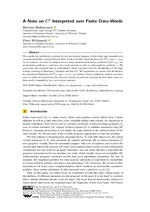A note on C2 interpreted over finite data-words
From International Center for Computational Logic
A note on C2 interpreted over finite data-words
Bartosz BednarczykBartosz Bednarczyk, Piotr WitkowskiPiotr Witkowski
Bartosz Bednarczyk, Piotr Witkowski
A note on C2 interpreted over finite data-words
In Emilio Muñoz-Velasco, Ana Ozaki, Martin Theobald, eds., Proceedings of the 27th International Symposium on Temporal Representation and Reasoning (TIME 2020), volume 178 of Leibniz International Proceedings in Informatics, 17:1--17:14, September 2020. Schloss Dagstuhl - Leibniz-Zentrum fuer Informatik
A note on C2 interpreted over finite data-words
In Emilio Muñoz-Velasco, Ana Ozaki, Martin Theobald, eds., Proceedings of the 27th International Symposium on Temporal Representation and Reasoning (TIME 2020), volume 178 of Leibniz International Proceedings in Informatics, 17:1--17:14, September 2020. Schloss Dagstuhl - Leibniz-Zentrum fuer Informatik
- KurzfassungAbstract
We consider the satisfiability problem for the two-variable fragment of first-order logic extended with counting quantifiers, interpreted over finite words with data, denoted here with C2[≤,succ,∼,πbin]. In our scenario, we allow for using arbitrary many uninterpreted binary predicates from π_bin, two navigational predicates ≤ and succ over word positions as well as a data-equality predicate ~. We prove that the obtained logic is undecidable, which contrasts with the decidability of the logic without counting by Montanari, Pazzaglia and Sala [MontanariPS16]. We supplement our results with decidability for several sub-fragments of C2[≤, succ, ∼ ,π_bin], e.g., without binary predicates, without successor succ, or under the assumption that the total number of positions carrying the same data value in a data-word is bounded by an a priori given constant. - Weitere Informationen unter:Further Information: Link
- Forschungsgruppe:Research Group: Computational LogicComputational Logic
@inproceedings{BW2020,
author = {Bartosz Bednarczyk and Piotr Witkowski},
title = {A note on C2 interpreted over finite data-words},
editor = {Emilio Mu{\~{n}}oz-Velasco and Ana Ozaki and Martin Theobald},
booktitle = {Proceedings of the 27th International Symposium on Temporal
Representation and Reasoning (TIME 2020)},
series = {Leibniz International Proceedings in Informatics},
volume = {178},
publisher = {Schloss Dagstuhl - Leibniz-Zentrum fuer Informatik},
year = {2020},
month = {September},
pages = {17:1--17:14},
doi = {10.4230/LIPIcs.TIME.2020.17}
}
